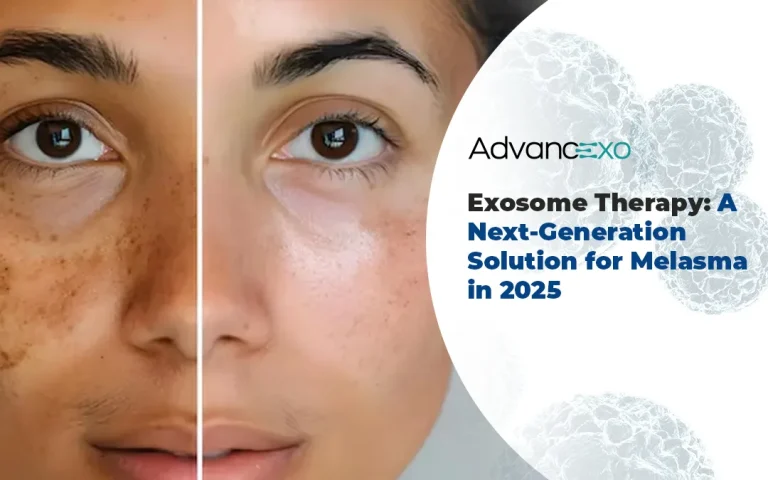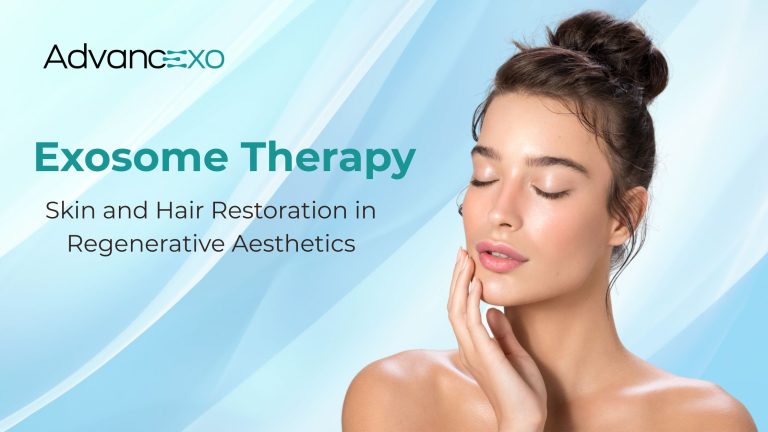Atopic dermatitis is a chronic disorder that leads to red, dry, itchy, scaly and crusty patches on skin. It generally appears in the early stages of life, causing lighter or darker areas on the skin. The involvement of both the skin integrity and the immune system adds to the complexity and multifactorial nature of the disorder. Several treatments have been introduced, but they have either limited effects or adverse complications.
Exosome treatment for atopic dermatitis has emerged as a promising solution. The multidimensional approach of this therapy proves beneficial in such a disorder. This innovative solution can surpass other treatments in this regard with its holistic solution.
Atopic Dermatitis
Atopic dermatitis, also known as eczema, is a serious condition that results in dry, red, and itchy skin, often leading to crusty or scaly patches, which can have a darker or lighter tone. Additionally, under-eye darkening and skin thickening are also seen. The factors driving the disorder are not understood, but they primarily include hereditary genes and environmental allergens.
The disorder results from a defective skin barrier. Research studies have indicated a decrease in ceramide content and changes in filaggrin protein to be the driving forces of this disorder. Ceramide is vital for barrier function. It also prevents water loss, thereby preserving hydrated skin. The loss of ceramide causes a defect in the barrier, thus allowing allergens to penetrate the barrier and induce an inflammatory cascade. However, an overactive immune response causes further damage. The defective barrier also shows a higher susceptibility to infections and allergies. The treatment for atopic dermatitis generally includes moisturizers and anti-inflammatory medications.
Exosomes: The Holistic Approach
Exosomes are the nanosized particles that facilitate cell communication. They carry a plethora of biomolecules that contain the message from the cells that synthesized them. The exosomes transport them to another cell, releasing these biomolecules that deliver the messages. According to the messages, cells modify their response. These molecules grant unique properties to exosomes that assist them in treating cosmetic issues:
Regeneration: Promote cell proliferation and suppress cell death
Anti-inflammation: Reduce inflammation
Antioxidant: Consume reactive oxygen species that cause oxidative stress on cells.
Immune Modulation: Regulate the immune system
Angiogenesis: Form more blood vessels
With these properties, exosome therapy for atopic dermatitis works in the following manner:
Restore Skin Barrier
The barrier consists of cells- keratinocytes and fibroblasts. While keratinocytes form the outer layers of the barrier, fibroblasts synthesize proteins, such as collagen, elastin, etc., that form the matrix of the barrier. Exosomes inhibit the death of these cells and promote their proliferation, which effectively restores the barrier.
Keratinocyte Differentiation
The altered differentiation of keratinocytes is also responsible for dermatitis. Exosome treatment alters the cell cycle events and re-establishes the normal differentiation process to mitigate the disorder.
Ceramide Booster
Exosome therapy also increases the production of ceramide to prevent water loss and moisturize the skin.
Anti-inflammation
Exosome treatment alleviates inflammation by inducing the production of anti-inflammatory cytokines and inhibiting the pro-inflammatory cytokine generation.
Immune response
Exosome therapy regulates the immune response and transitions it towards repair processes.
In-depth Hydration
Hyaluronic acid attracts water molecules and creates volume, thus providing structural support and hydrating the skin. Exosomes suppress the breakdown of hyaluronic acid and increase its production, thereby hydrating the dry skin present in eczema.
Enhanced Skin health
Exosome therapy also elevates the number of blood vessels. The increased quantity of vessels nourishes the skin by delivering adequate amounts of nutrients and oxygen.
Furthermore, exosomes also decrease oxidative stress and melanin synthesis, which prevent damage and reduce dark patches, respectively.
Clinical Evidence
Exosome therapy has created its niche in cosmetic treatment owing to extensive research behind it. The application of exosomes in atopic dermatitis has shown favorable results. Animal studies have detected changes in the blood markers for inflammation after exosome treatment. A scientific report documented an increase in ceramide levels by exosomes that, in turn, improved keratinocyte differentiation, which can potentially hydrate the skin.
Exosomes also activate the adequate genes involved in cellular pathways of the disorder. They also show a decrease in mRNA levels of inflammatory mediators. A case study even reported visible improvement in the thickened skin after exosome therapy. Several scientific studies have proven the safety of exosomes. Therefore, exosome therapy is poised to be the next-generation solution to treat atopic dermatitis.
Benefits of Exosome Therapy
- The treatments of dermatitis focus on one of the underlying pathways like inflammation, barrier restoration, hydration, etc. For acting on multiple pathways, combination therapy of different medications is prescribed. Exosomes for atopic dermatitis, on the other hand, single-handedly work on different aspects of the disorder.
- The dry, scaly, or crusty patches often require long-term use of medications that can cause adverse effects. Exosome treatment shows visible improvements with lasting effects without causing adverse complications.
- Exosomes are a complete package. They work on entire skin health and also mitigate other cosmetic problems such as blemishes, hyperpigmentation, aging signs, etc., thereby uplifting the facial features substantially.
- Exosomes have minimally invasive applications and require low recovery time. It can be combined with different treatments for enhanced outcomes or applied topically.
The Versatile Exosome Therapy
The advantages of therapy are manifold. The exosome treatment is highly recommended for individuals who have responded poorly to the previous treatment. The restoration of the skin barrier by exosomes also reduces acne scars. The anti-inflammation property is beneficial in dealing with other skin diseases such as psoriasis. The therapy improves skin texture and tone, therefore, is suitable as a routine facial treatment. The application of exosome treatment even extends to hair restoration in cases of hair loss and thinning. The therapy does not contain any artificial additives; therefore, it is suitable for all skin types.
Conclusion
The past decade has seen a considerable rise in exosome research. Its applications in medical disorders have yielded positive results in early studies. Now, exosome therapy is taking aesthetic treatments to new heights by its ability to treat skin diseases like atopic dermatitis effectively. Numerous studies on cells, animals, and humans have shown noteworthy improvements in the disorder after exosome treatment.
Unlike conventional treatments, it works holistically, acting on multiple pathways instead of targeting only a selected few. People and medical professionals are resorting to exosome treatment for atopic dermatitis due to the poor efficacy of traditional treatments. Advancexo is promoting exosome therapy in India through its exclusive Skin Rejuve kit. The exosomes in the kit have been scientifically researched, meticulously prepared, and thoroughly tested before being introduced into the market.
FAQ's
It is a medical disorder that results in dry, red, and itchy skin, which can develop into scaly or crusty patches.
It occurs as a result of defective skin barrier and immune system dysregulation. Ceramides that prevent water loss in the skin decrease in levels along with a decrease in other skin proteins, resulting in dry and inflamed skin.
Exosomes increase the level of ceramides, reduce inflammation, hydrate skin, nourish skin and regulate the immune responses to alleviate the disorder.
Generally, 4-6 sessions are considered sufficient for effective results. However, the number of sessions depends on the severity of eczema.

